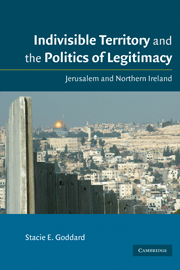Book contents
- Frontmatter
- Contents
- Acknowledgments
- 1 Introduction
- 2 Constructing Indivisibility: A Legitimation Theory of Indivisible Territory
- PART ONE CONSTRUCTING AN INDIVISIBLE IRELAND
- Introduction
- 3 Home Rule: A Divisible Ireland
- 4 “Ulster Will Fight”: The Orange Card and an Indivisible Ireland
- PART TWO JERUSALEM: THE ETERNAL INDIVISIBLE CITY
- 8 Conclusion
- Bibliography
- Index
Introduction
from PART ONE - CONSTRUCTING AN INDIVISIBLE IRELAND
Published online by Cambridge University Press: 26 January 2010
- Frontmatter
- Contents
- Acknowledgments
- 1 Introduction
- 2 Constructing Indivisibility: A Legitimation Theory of Indivisible Territory
- PART ONE CONSTRUCTING AN INDIVISIBLE IRELAND
- Introduction
- 3 Home Rule: A Divisible Ireland
- 4 “Ulster Will Fight”: The Orange Card and an Indivisible Ireland
- PART TWO JERUSALEM: THE ETERNAL INDIVISIBLE CITY
- 8 Conclusion
- Bibliography
- Index
Summary
The conflict over Ireland seems inherently indivisible, a dispute that began more than 600 years ago and continues into the unrest in Northern Ireland today. However ancient the roots of conflict in Ireland, contemporary disputes emerged after England claimed Ireland for her empire in the Act of Union of 1801. In the years following the Act of Union, Irish elites would work almost continuously to gain back some form of sovereignty, be it in the form of greater representation at Westminster, an autonomous parliament in Ireland, or the establishment of a full-fledged Irish Republic.
From the mid-nineteenth to the early twentieth century, Anglo-Irish politics was dominated by the fight for Home Rule. With Home Rule, Ireland would remain a subject of the British Empire, but would be granted a separate parliament to govern its domestic affairs. The push for Home Rule began in the 1830s, when Daniel O'Connell – who through his Catholic Emancipation movement had won the Catholics of Ireland voting rights – argued that the Act of Union should be repealed, and that Ireland should be granted its own legislature. O'Connell, like many Irish politicians who followed him, stressed that Ireland would not cast off its imperial ties to Britain, arguing that “the crown of Ireland [was] an imperial crown, inseparably annexed to the crown of Great Britain, on which connexion the interests and happiness of both countries essentially depend.”
Repeal, however, was anathema to the British, and by the mid-1840s the movement had clearly failed.
- Type
- Chapter
- Information
- Indivisible Territory and the Politics of LegitimacyJerusalem and Northern Ireland, pp. 47 - 57Publisher: Cambridge University PressPrint publication year: 2009

